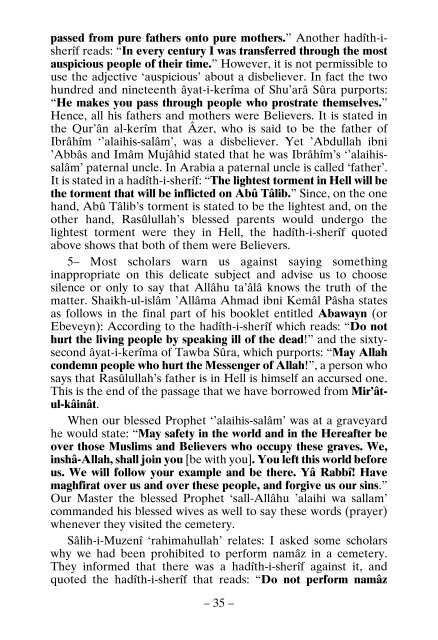The Rising and the Hereafter
Allâhu ta’âlâ pities all the people on the earth, and sends them the useful things He creates. He has taught the entire humanity how they should act and behave so that they may lead a life of comfort and peace in the world and in the Hereafter. Choosing some of the people whose deserved destination in the Hereafter is Hell, He will magnanimously forgive them and bless them with Paradise....
Allâhu ta’âlâ pities all the people on the earth, and sends them the useful things He creates. He has taught the entire humanity how they should act and behave so that they may lead a life of comfort and peace in the world and in the Hereafter. Choosing some of the people whose deserved destination in the Hereafter is Hell, He will magnanimously forgive them and bless them with Paradise....
Create successful ePaper yourself
Turn your PDF publications into a flip-book with our unique Google optimized e-Paper software.
passed from pure fa<strong>the</strong>rs onto pure mo<strong>the</strong>rs.”Ano<strong>the</strong>rhadîth-isherîfreads:“In<br />
every century I was transferred through <strong>the</strong> most<br />
auspicious people of <strong>the</strong>ir time.”However,itisnotpermissibleto<br />
use<strong>the</strong>adjective‘auspicious’aboutadisbeliever.Infact<strong>the</strong>two<br />
hundred <strong>and</strong> nineteenth âyat-i-kerîma of Shu’arâ Sûra purports:<br />
“He makes you pass through people who prostrate <strong>the</strong>mselves.”<br />
Hence,allhisfa<strong>the</strong>rs<strong>and</strong>mo<strong>the</strong>rswereBelievers.Itisstatedin<br />
<strong>the</strong> Qur’ân al-kerîm that Âzer, who is said to be <strong>the</strong> fa<strong>the</strong>r of<br />
Ibrâhîm ‘’alaihis-salâm’, was a disbeliever. Yet ’Abdullah ibni<br />
’Abbâs<strong>and</strong>ImâmMujâhidstatedthathewasIbrâhîm’s‘’alaihissalâm’paternaluncle.InArabiaapaternaluncleiscalled‘fa<strong>the</strong>r’.<br />
Itisstatedinahadîth-i-sherîf:“<strong>The</strong> lightest torment in Hell will be<br />
<strong>the</strong> torment that will be inflicted on Abû Tâlib.”Since,on<strong>the</strong>one<br />
h<strong>and</strong>,AbûTâlib’stormentisstatedtobe<strong>the</strong>lightest<strong>and</strong>,on<strong>the</strong><br />
o<strong>the</strong>r h<strong>and</strong>, Rasûlullah’s blessed parents would undergo <strong>the</strong><br />
lightest torment were <strong>the</strong>y in Hell, <strong>the</strong> hadîth-i-sherîf quoted<br />
aboveshowsthatbothof<strong>the</strong>mwereBelievers.<br />
5– Most scholars warn us against saying something<br />
inappropriate on this delicate subject <strong>and</strong> advise us to choose<br />
silence or only to say that Allâhu ta’âlâ knows <strong>the</strong> truth of <strong>the</strong><br />
matter.Shaikh-ul-islâm’AllâmaAhmadibniKemâlPâshastates<br />
as follows in <strong>the</strong> final part of his booklet entitled Abawayn (or<br />
Ebeveyn):Accordingto<strong>the</strong>hadîth-i-sherîfwhichreads:“Do not<br />
hurt <strong>the</strong> living people by speaking ill of <strong>the</strong> dead!”<strong>and</strong><strong>the</strong>sixtysecondâyat-i-kerîmaofTawbaSûra,whichpurports:“May<br />
Allah<br />
condemn people who hurt <strong>the</strong> Messenger of Allah!”,apersonwho<br />
saysthatRasûlullah’sfa<strong>the</strong>risinHellishimselfanaccursedone.<br />
Thisis<strong>the</strong>endof<strong>the</strong>passagethatwehaveborrowedfromMir’âtul-kâinât.<br />
WhenourblessedProphet‘’alaihis-salâm’wasatagraveyard<br />
hewouldstate:“May safety in <strong>the</strong> world <strong>and</strong> in <strong>the</strong> <strong>Hereafter</strong> be<br />
over those Muslims <strong>and</strong> Believers who occupy <strong>the</strong>se graves. We,<br />
inshâ-Allah, shall join you [bewithyou]. You left this world before<br />
us. We will follow your example <strong>and</strong> be <strong>the</strong>re. Yâ Rabbî! Have<br />
maghfirat over us <strong>and</strong> over <strong>the</strong>se people, <strong>and</strong> forgive us our sins.”<br />
Our Master <strong>the</strong> blessed Prophet ‘sall-Allâhu ’alaihi wa sallam’<br />
comm<strong>and</strong>edhisblessedwivesaswelltosay<strong>the</strong>sewords(prayer)<br />
whenever<strong>the</strong>yvisited<strong>the</strong>cemetery.<br />
Sâlih-i-Muzenî ‘rahimahullah’ relates: I asked some scholars<br />
why we had been prohibited to perform namâz in a cemetery.<br />
<strong>The</strong>y informed that <strong>the</strong>re was a hadîth-i-sherîf against it, <strong>and</strong><br />
quoted <strong>the</strong> hadîth-i-sherîf that reads: “Do not perform namâz<br />
–35 –

















